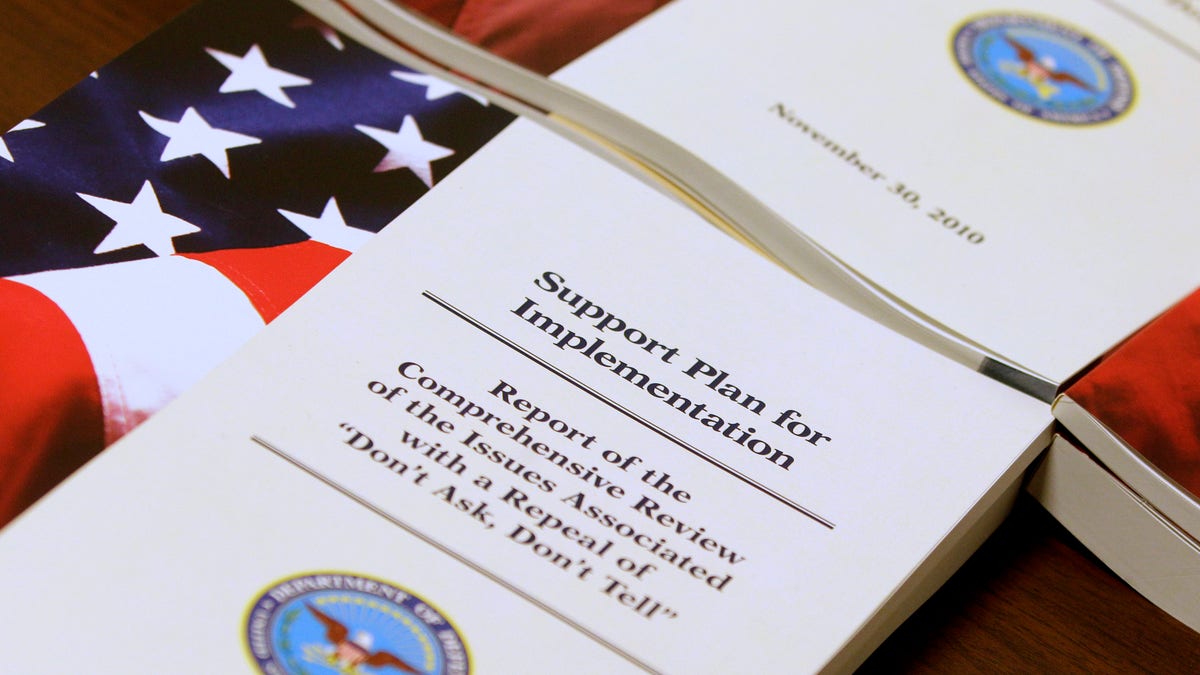
A report of a Pentagon survey on the issues associated with a repeal of "Don't Ask, Don't Tell" is seen on a table,at the Pentagon, Tuesday, Nov. 30, 2010, after Defense Secretary Robert Gates and Joint Chiefs Chairman Adm. Mike Mullen spoke to reporters on gays in the military. (AP Photo/Charles Dharapak) (AP)
WASHINGTON – The Pentagon is playing down the risk of infantry and other combat arms troops causing problems if "don't ask, don't tell" is overturned.
In a first-of-its-kind survey released this week, the Pentagon found that two-thirds of the overall force predicted little impact on the military's ability to fight if gays were allowed to serve openly.
But among those who did care, most were troops performing combat arms duties. Nearly 60 percent of those in the Marine Corps and in Army combat units said they thought repealing the law would hurt their units' ability to fight on the battlefield.
Opponents of repeal, led by Sen. John McCain, R-Ariz., were expected to use these findings to argue that Congress shouldn't reverse the law at a time of two wars. The military's service chiefs have expressed similar concerns and are expected to testify Friday.
But Sen. Joe Lieberman, an independent from Connecticut, said Wednesday that with a majority of Americans now supportive of gays serving in the military, "the final question was 'will it work' — will somehow repealing don't ask don't tell compromise military effectiveness?"
"And the study ... says no, it will not," Lieberman said on MSNBC's "Morning Joe" program. "So I hope that means we can get this done this year."
The study suggests an "abundance of care and preparation" is needed before changing personnel policy, Defense Secretary Robert Gates said Tuesday. But he told reporters the concerns expressed by combat troops "do not present an insurmountable barrier to successful repeal of 'don't ask, don't tell.'"
"This can be done and should be done without posing a serious risk to military readiness," he added.
Senate Democrats plan to force a vote this month. But there was no indication that Democrats could overcome GOP objections with just a few weeks left in the lame-duck session despite the study's upbeat assessment of how repeal could be done without hurting the force.
McCain was still reviewing the findings Tuesday, spokeswoman Brooke Buchanan said.
President Barack Obama has called it a top priority to repeal the 1993 law that bans openly gay service. But gay rights groups have complained that he and Senate Majority Leader Harry Reid have done little to see it through, focusing their efforts instead on tax cuts and a nuclear arms treaty with Russia.
Advocates for repeal say opposition in small pockets of the force shouldn't keep the military from moving forward.
A gay Air Force officer who runs a support group called "Outserve" and uses the pseudonym "JD Smith" said resistance within combat arms groups is likely higher because of older commanders.
"Leadership sets the tone, and you see that (attitude) reflected throughout the unit," Smith said. If unit commanders are asked to change, opposition will drop, Smith predicted.
The survey of some 400,000 troops found a strong correlation between a person's experience with gays and their acceptance of open service. The study found that of those who believe they have served alongside a gay person, 92 percent said their unit was able to work together.
When asking that same question of Marines who have worked with a gay person, 84 percent said they thought unit morale and cohesion hadn't been affected.
"At the end of the day, whatever the decision of our elected leaders may be, we in uniform have an obligation to follow orders," said Adm. Mike Mullen, chairman of the Joint Chiefs of Staff.
___
Associated Press writer Pauline Jelinek in Washington contributed to this report.









































